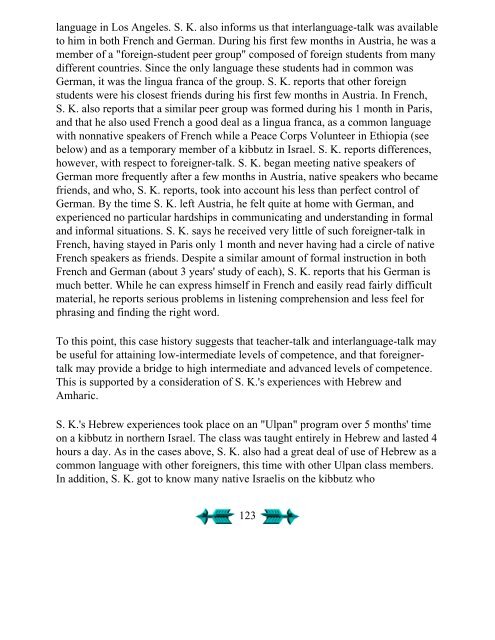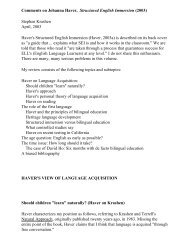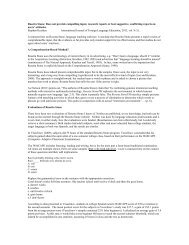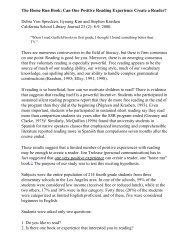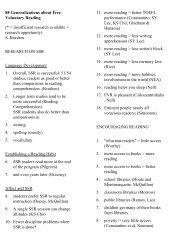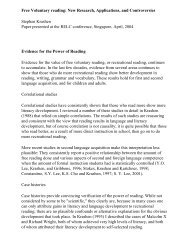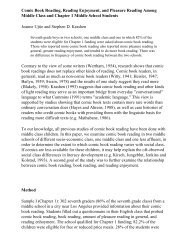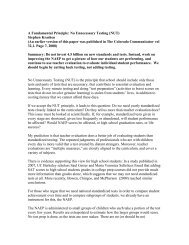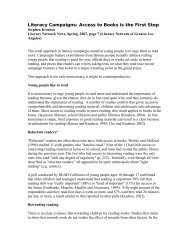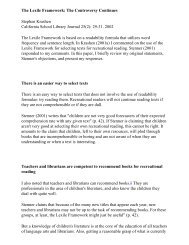Second Language Acquisition and Second ... - Stephen Krashen
Second Language Acquisition and Second ... - Stephen Krashen
Second Language Acquisition and Second ... - Stephen Krashen
You also want an ePaper? Increase the reach of your titles
YUMPU automatically turns print PDFs into web optimized ePapers that Google loves.
language in Los Angeles. S. K. also informs us that interlanguage-talk was available<br />
to him in both French <strong>and</strong> German. During his first few months in Austria, he was a<br />
member of a "foreign-student peer group" composed of foreign students from many<br />
different countries. Since the only language these students had in common was<br />
German, it was the lingua franca of the group. S. K. reports that other foreign<br />
students were his closest friends during his first few months in Austria. In French,<br />
S. K. also reports that a similar peer group was formed during his 1 month in Paris,<br />
<strong>and</strong> that he also used French a good deal as a lingua franca, as a common language<br />
with nonnative speakers of French while a Peace Corps Volunteer in Ethiopia (see<br />
below) <strong>and</strong> as a temporary member of a kibbutz in Israel. S. K. reports differences,<br />
however, with respect to foreigner-talk. S. K. began meeting native speakers of<br />
German more frequently after a few months in Austria, native speakers who became<br />
friends, <strong>and</strong> who, S. K. reports, took into account his less than perfect control of<br />
German. By the time S. K. left Austria, he felt quite at home with German, <strong>and</strong><br />
experienced no particular hardships in communicating <strong>and</strong> underst<strong>and</strong>ing in formal<br />
<strong>and</strong> informal situations. S. K. says he received very little of such foreigner-talk in<br />
French, having stayed in Paris only 1 month <strong>and</strong> never having had a circle of native<br />
French speakers as friends. Despite a similar amount of formal instruction in both<br />
French <strong>and</strong> German (about 3 years' study of each), S. K. reports that his German is<br />
much better. While he can express himself in French <strong>and</strong> easily read fairly difficult<br />
material, he reports serious problems in listening comprehension <strong>and</strong> less feel for<br />
phrasing <strong>and</strong> finding the right word.<br />
To this point, this case history suggests that teacher-talk <strong>and</strong> interlanguage-talk may<br />
be useful for attaining low-intermediate levels of competence, <strong>and</strong> that foreignertalk<br />
may provide a bridge to high intermediate <strong>and</strong> advanced levels of competence.<br />
This is supported by a consideration of S. K.'s experiences with Hebrew <strong>and</strong><br />
Amharic.<br />
S. K.'s Hebrew experiences took place on an "Ulpan" program over 5 months' time<br />
on a kibbutz in northern Israel. The class was taught entirely in Hebrew <strong>and</strong> lasted 4<br />
hours a day. As in the cases above, S. K. also had a great deal of use of Hebrew as a<br />
common language with other foreigners, this time with other Ulpan class members.<br />
In addition, S. K. got to know many native Israelis on the kibbutz who<br />
123


